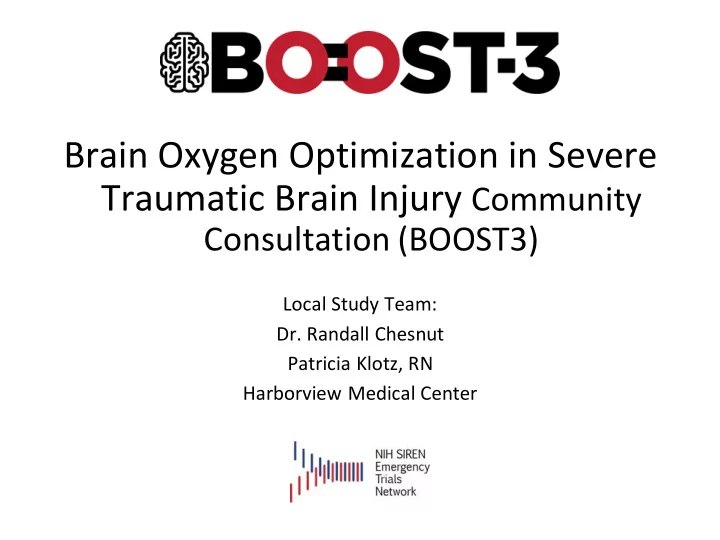

Brain Oxygen Optimization in Severe Traumatic Brain Injury Community Consultation (BOOST3) Local Study Team: Dr. Randall Chesnut Patricia Klotz, RN Harborview Medical Center
The Study Principal Investigator Dr. Randall Chesnut
Topics for today • Traumatic brain injury (TBI) • The BOOST3 study • Emergency research and consent
What is Traumatic Brain Injury (TBI)? Traumatic Brain Injury is sudden damage to the brain caused by an outside force - such as a car crash, a fall, or something hitting the head.
TBI is the leading cause of death in children and adults ages 1 to 44 years • Every 15 seconds, someone in the US suffers a major TBI! • Every 5 minutes, someone is forever disabled as a result of TBI.
What problems does TBI cause? Death Coma Inability to think clearly Memory loss Impaired balance and coordination Inability to return to work Inability to live independently
Does anyone here know someone who suffers from a brain injury?
Treatment of Severe TBI • Ventilators • Lots of tubes, lines, and monitors • Goal directed care • Brain pressure • Brain oxygen levels
A research study designed to learn if either of two alternative strategies for monitoring and treating patients with TBI in the intensive care unit (ICU) is more likely to help them get better.
Have any of you been in a medical research study? What was your experience like?
Who WILL be included in this study? • Anybody who is 14 years or older with • Blunt closed head trauma, with • Severe brain injury, and who • Is having brain probes placed immediately (typically within 2 to 10 hours of injury)
Who will NOT be included in the study • Children less than 14 years of age • Women known to be pregnant • Prisoners or others in police custody • Those wearing a medical alert “opt - out”
How will the study work? ● Screen for eligibility ● Everyone will be treated for their TBI ● Eligible patients are those already getting two probes placed ■ ICP (intracranial pressure) probe ■ Brain tissue oxygen (PbtO2) probe
Participants placed in one of two groups Which group is determined by chance, like flipping a coin • Group 1: Care based on monitoring of pressure in the brain (intracranial pressure or ICP) alone. • Group 2: Care based on the monitoring of both ICP and the amount of oxygen in the brain (brain tissue oxygen or PbtO2).
What else will happen in this study? Participants in both study groups will: • Receive TBI care guided by probe data for up to five days. • Blood or cerebrospinal fluid (CSF) may be collected for research purposes. • Be called every month after injury for 5 months to see how they are doing. • Be asked to return to the clinic 6 months after their brain injury to take a series of paper and pencil tests.
What are the possible risks? • Medical Risks • Pneumonia or lung injury • Severe sepsis (blood infection) • Bleeding or Infection in the brain from probes • Research Risks • Breach of confidentiality • Pain or bruising from blood draws for research • Unanticipated risks
What are the possible benefits? • Potential for direct benefit to participants if the strategy they receive improves recovery • Potential for benefit to future patients with traumatic brain injury from what is learned from this study.
How are emergency studies different? • In most studies, investigators explain what will happen, describe possible risks and possible benefits, answer questions, and then the eligible patients decide whether to participate. This process is called Informed Consent . • In this emergency study, eligible patients are unconscious and cannot decide or communicate whether or not they wish to participate in a study. Also, treatment is started emergently often before family or other representatives are available to decide for the patient.
So how do we do emergency research? Specific federal regulations allow an Exception From Informed Consent for emergency research EFIC is only allowed when : • The condition being studied is life-threatening • Existing treatments are unproven or inadequate • There is potential benefit to participants • Getting consent is not possible
Special requirements for EFIC • Community consultation (why we are here) • Public disclosure before and after the study • Oversight during the study
How does EFIC work in BOOST3 • If a family member or representative is available, they will decide for the patient • If not, eligible patients will be started in the study without consent • Family members or representatives are told about the study as soon as possible and asked whether participation can continue
What if I don’t want to be in the study? • Ask us for a medical alert bracelet that says “BOOST - 3 study declined” or add those words to your existing medical-alert notification. • In the event you suffer a severe traumatic brain injury, you will not be enrolled in the study if you are wearing that medical alert notification when you arrive at the hospital.
What do you think about BOOST-3? The study has not started yet, so . . . • We want to hear your thoughts. • Tell us about your experiences. • Do you think it is okay to do this study? • The study team and the research review board will consider your opinions before deciding if it is okay to do in our community.
Questions? If you have any questions, comments, or concerns about the study, please speak with us now and/or contact us at: Principal Researcher: Dr. Randall Chesnut Study Coordinator: Patricia Klotz, RN boost3@uw.edu boost3trial.org
Recommend
More recommend